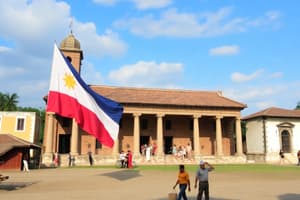Podcast
Questions and Answers
Which country ruled over the Philippines for more than 300 years?
Which country ruled over the Philippines for more than 300 years?
- France
- United States
- Spain (correct)
- Portugal
When did the Spanish-American War bring Spain's rule in the Philippines to an end?
When did the Spanish-American War bring Spain's rule in the Philippines to an end?
- 1872
- 1896
- 1898 (correct)
- 19th century
What was the name of the war that followed the Spanish-American War in the Philippines?
What was the name of the war that followed the Spanish-American War in the Philippines?
- Philippine Revolution
- Filipino independence struggle
- Cavite Mutiny
- Philippine-American War (correct)
Who were the primary opponents of Spanish power within the Roman Catholic Church in the Philippines?
Who were the primary opponents of Spanish power within the Roman Catholic Church in the Philippines?
What was the main reason for the emergence of a desire for Philippine independence in the 19th century?
What was the main reason for the emergence of a desire for Philippine independence in the 19th century?
Who led the Katipunan, an anticolonial secret organization during the Philippine Revolution?
Who led the Katipunan, an anticolonial secret organization during the Philippine Revolution?
When did the Philippine Revolution begin?
When did the Philippine Revolution begin?
What did the leaders of the Katipunan name the newly established government during the Philippine Revolution?
What did the leaders of the Katipunan name the newly established government during the Philippine Revolution?
Which attack during the Philippine Revolution failed?
Which attack during the Philippine Revolution failed?
Who were the leaders from two different factions who led the rebels in Cavite during the Philippine Revolution?
Who were the leaders from two different factions who led the rebels in Cavite during the Philippine Revolution?
Flashcards
Country ruling Philippines
Country ruling Philippines
Spain ruled over the Philippines for more than 300 years.
End of Spanish rule
End of Spanish rule
The Spanish-American War ended Spain's rule in the Philippines in 1898.
War following Spanish-American War
War following Spanish-American War
The conflict that followed was called the Philippine-American War.
Opponents of Spanish power
Opponents of Spanish power
Signup and view all the flashcards
Desire for independence
Desire for independence
Signup and view all the flashcards
Leader of Katipunan
Leader of Katipunan
Signup and view all the flashcards
Start of the Philippine Revolution
Start of the Philippine Revolution
Signup and view all the flashcards
Name of new government
Name of new government
Signup and view all the flashcards
Failed attack in revolution
Failed attack in revolution
Signup and view all the flashcards
Cavite rebel leaders
Cavite rebel leaders
Signup and view all the flashcards
Study Notes
Colonial Rule and Wars
- Spain ruled over the Philippines for more than 300 years, significantly shaping its culture and governance.
- The Spanish-American War ended Spain's rule over the Philippines in 1898, transitioning control to the United States.
After Spanish-American War
- The Philippine-American War followed the Spanish-American War, marking a conflict between Filipino revolutionaries and American forces.
Church Opposition
- Primary opponents of Spanish authority within the Roman Catholic Church included the native clergy who sought reform and greater autonomy from Spanish ecclesiastical control.
Rise of Independence Movement
- The emergence of a desire for Philippine independence in the 19th century was primarily fueled by nationalistic sentiments and discontent with colonial governance.
Leadership of Revolution
- Andres Bonifacio led the Katipunan, an influential anticolonial secret organization during the Philippine Revolution, advocating for independence.
Philippine Revolution Timeline
- The Philippine Revolution commenced in 1896, signifying a unified effort against colonial rule.
Government Establishment
- The Katipunan’s leaders named the newly established government "Katipunan ng mga Anak ng Bayan" during the revolution, aiming for a national identity.
Notable Military Events
- The attack on Manila during the Philippine Revolution failed, highlighting tactical challenges faced by rebel forces.
Cavite Rebels
- Two factions in Cavite were led by leaders Emilio Aguinaldo and Mariano Alvarez, who played crucial roles during the revolution.
Studying That Suits You
Use AI to generate personalized quizzes and flashcards to suit your learning preferences.
Description
Test your knowledge on the Philippine Revolution and the struggle for Filipino independence. Learn about the key events, leaders, and outcomes of this historic period in Philippine history.



